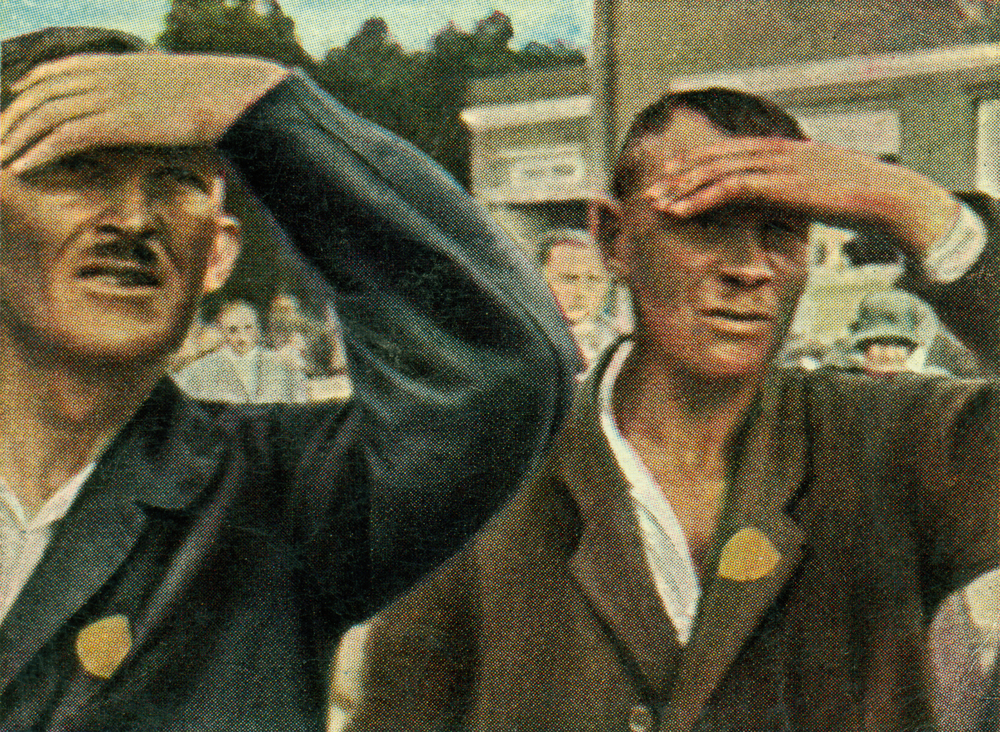Many are familiar with F.A. Hayek’s Road to Serfdom. Fewer know of Wilhelm Röpke’s The Solution to the German Problem. The two books are in basic agreement about the political and economic factors leading to the rise of the Third Reich, but Röpke’s greater emphasis on economic culture yielded timeless insights about the human capacity for blindness when confronted with truths that are, or which seem to be, too terrible to look at.

The arguments of The Road to Serfdom and The Solution to the German Problem overlap in fundamental respects. Shortly after the Potsdam Agreement, both shot a warning flare to those who were willing to see it: Hayek threatened that “It is necessary now to state the unpalatable truth that it is Germany whose fate we are now in some danger of repeating,” and Röpke cautioned a year later in his own volume, “let not the Englishman or America be too sure that ‘it can’t happen here’.” Why? Both thought that fascism and socialism are not to be understood as distant and incompatible enemies but as cousins with shared essentials, most importantly collectivism.
What distinguished Röpke’s argument was the claim that it was a kind of cultural sickness that explained the rise of Nazi Germany, and it was a sickness that Germany shared with the western powers. The Solution to the German Problem is a wide-ranging volume that covers a lot of ground, going back even to the forests of medieval Germany in search of the cultural sources of the Third Reich; these pathways of the book are fascinating, but it is not my aim to provide a summary. Instead, I focus here only on the main argument, which was that the blindness of Germans and of the rest of the world to the Nazi threat was due to a “weakening of the moral reflexes.”
The result was that people “were blind because they were determined to be blind,” even in the face of “unprecedented barbarism.” In this modern tragedy people “simply did not want to know, because it was inconvenient knowledge.” In this scenario, there was “universal passivity” and “paralysis” resulting from “a spiritual and moral poisoning” that made people determined to “ignore the writing on the wall in order to postpone the day of reckoning and to purchase a few years of peace and comfort, at the price of a most terrible final catastrophe.”
One really must go to Röpke’s A Humane Economy to see the kinds of virtues growing from a rich cultural soil that he thought were necessary for people who would have been more capable of rising to the occasion of pre-war Germany. In his diagnosis of a “spiritual and moral poisoning,” Röpke had in mind this broad cultural foundation of virtue, but one can point to various concrete instances of their absence in the history of the rise of the Third Reich that seem to bear this out: the stab-in-the-back myth that allowed many Germans to lay blame for the loss of the Great War and the signing of the Armistice on civilians and, in particular, Jewish people, rather than on the Army; the unwillingness of the various parties in the Reichstag to coalesce around a unified opposition to the National Socialists even after the Beer Hall Putsch; the unwillingness of the allied nations to take action even after open German rearmament began – in obvious violation of the terms of Versailles; the collective plugging of the ears during Churchill’s many warnings in the years preceding the invasion of Poland. One could add to this list a certain strain of American isolationist impulse, well described in a recent book; this, I hasten to add, is an impulse sometimes wedded to a bizarre antisemitism.

What one cannot add to that list is Wilhelm Röpke. A professor in Germany at the time of the birth of the Third Reich, he thought his platform gave him a duty to “speak a word of warning,” so he wrote and distributed a leaflet, in which he appealed to his fellow Germans’ “common sense and their consciences,” showing “how appallingly they were being deceived.” Although his warnings fell well short of the actual atrocities that would come by Nazi hands, he was “laughed at and abused.” Later, he delivered a speech, incidentally on the very morning before the burning of the Reichstag in February 1933; in it, Röpke warned that the Nazis were “proceeding to turn the garden of civilization into fallow land and to allow it to revert to the primeval jungle.” The speech caught the attention of the Nazis, and he soon fled in exile, until, through the blunt trauma of war, more people would see clearly that he had been right all along.
Bill Reddinger has been a professor of political science at Regent University since 2010. Prior to that, he taught political science at Wheaton College in Illinois and at South Texas College. He received his undergraduate degree from Grove City College in Pennsylvania before completing his M.A. and Ph.D. in Political Science at Northern Illinois University, where his studies focused on the history of political philosophy and American political thought. You can also find Reddinger’s posts in the OLL Reading Room.


READER COMMENTS
Ahmed Fares
Mar 30 2024 at 4:16pm
This by Tom Luongo explains a lot:
Davos, Trust, and the End of “Comfortable Wolves”
Another quote in the same vein:
Nine Meals from Anarchy
Monte
Mar 31 2024 at 1:36am
Yes. To Röpke, the chimera of modern tyranny, “whose ugliest and extremest form was Nazism”, was marked by “the entire dissolution of the values and standards without which our society, or any other, cannot exist in the long run: a pernicious anaemia of morality.” He believed that morality, more than any other guiding principle, was the lynch pin of tranquility, the “sharp dividing line between the realm of the spirit and the conditions of man’s existence.”
Roger McKinney
Apr 2 2024 at 10:18am
Mises’ Omnipotent Government is a better history of Germany before Hitler. Germany rejected classical liberalism in 1848 and fully embraced socialism in the 1870s under Bismarck. Socialism destroyed the economy but the people refused to give up on it. They refused because it was their new religion. They rejected Christianity with their embracing liberal theology denying the deity of Christ. They placed their hope of salvation in socialism. Without socialism they had no hope.
But socialism had so destroyed the economy that they needed relief. They desperately wanted to find any cause for their misery but socialism. Hitler appealed to ancient German hatred of Jews and love of military authority.
Bill Reddinger
Apr 4 2024 at 11:01am
Thanks Roger. Must admit that I haven’t read it yet. Will put it on my list.
Anders
Apr 4 2024 at 11:28am
Let us not forget Hitler was a socialist as well. In fact, he hated Luxembourgs liberal or Trotskys internationalist variety and admired Mussolini and later Stalin for their forceful approach. He simply wedded it to nationalism and to the resentment against Paris treaties, the folly of which Keynes in vain tried to make clear to a vengeful France and a starry eyed ailing Wilson.
At one point he lamented having to resort to corporatism rather than direct control, knowing Stalinism woul not fly in Germany.
Roger McKinney
Apr 2 2024 at 12:26pm
Germany lost its Christian culture long before Hitler. Richard Dawkins laments the loss of that culture in the UK and fears the consequences.
https://www.christianpost.com/news/richard-dawkins-laments-decline-of-cultural-christianity.html
Ahmed Fares
Apr 2 2024 at 2:37pm
Hitler quotes from Quora:
Religious views of Adolf Hitler
Anders
Apr 4 2024 at 11:35am
From Mein Kampf of course, a screed which goes on like that for five hundred pages in what by any logic is little but raving, unlettered madness.
I think Germans supported the Nazis in spite of all that. Perhaps a small prize to pay for stability, growth, and restitution of the punitive treaty that dogged them. Up until 1939, Hitler had achieved what he promised and could have stoppee. East Prussia remained, but a quiescent Pilsudski and a pusillanimous West would have agreee to a compromise for majority German lands.
It was when Hitler actually went on to put Mein Kampf into practice for real that they realised what they had started and took to the streets to protest Prague. Too late…
David Henderson
Apr 7 2024 at 12:21pm
Good post.
Comments are closed.